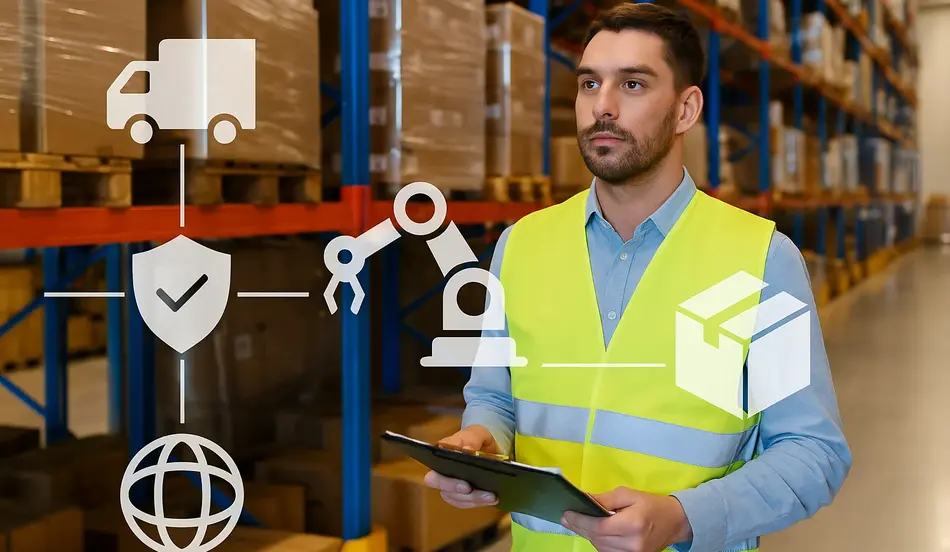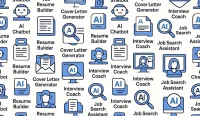Artificial intelligence (AI) has already changed the way businesses run their supply chains. From automated warehouses to predictive algorithms, the technology is taking over routine tasks once performed by humans. But while some jobs are at risk, others remain resilient. Experts say the positions most likely to survive the AI revolution are those requiring human judgment, strategic thinking, and relationship management.
Supply chain specialist Jamil Hai, who has worked across Asia, the Middle East, and North America for more than two decades, recently outlined the jobs he believes will remain safe. His assessment is grounded in real-world experience: jobs that demand not just information and knowledge, but also wisdom.
Here’s a closer look at the five categories of supply chain jobs that are highly unlikely to be replaced by AI, and what workers can do to futureproof their careers.
Table of Contents
The Changing Role of AI in Supply Chains
AI is not just a futuristic concept—it’s already here. Major companies use AI to forecast demand, manage warehouses, optimize shipping routes, and even negotiate supplier contracts. For example, Unilever has deployed AI in its procurement process to automatically evaluate supplier quotations, narrowing them down for human managers.
But as Hai explains, AI alone isn’t enough. “A successful AI solution is never just AI,” he said. “It’s an A+HI solution—artificial intelligence plus human intelligence. Humans must oversee the system, provide context, and make judgment calls where machines fall short.”
That distinction is what protects certain supply chain jobs from being fully automated.
1. Adaptive AI-Enabled Roles
While traditional roles such as forklift operators or delivery coordinators are at risk, new adaptive positions are emerging. These jobs combine technical know-how with human oversight of AI systems.
Examples include:
- AI route optimization analysts who review machine-generated delivery plans, test different models, and make adjustments based on weather, traffic, or client needs.
- Autonomous vehicle fleet managers who monitor driverless trucks and step in when unexpected challenges arise.
- Warehouse automation supervisors who operate robots while ensuring safety and efficiency.
“These roles represent a promotion of sorts,” Hai said. “If you were a forklift operator, you can upskill to manage the robots doing the same job. You add human intelligence to AI outputs, and that makes you indispensable.”
Industry data backs this up. According to McKinsey & Company, AI is projected to displace nearly 25% of repetitive warehouse tasks by 2030, but demand for supervisors who can manage hybrid human-machine environments is expected to rise.
2. Procurement and Supplier Relationship Management
Procurement involves more than contracts and purchase orders. It requires trust, negotiation, and diplomacy—qualities no algorithm can replicate.
Procurement managers, supplier relationship managers, and vendor managers remain crucial. Even as AI tools streamline data analysis and routine bidding processes, the human element dominates when it comes to final decisions.
“You don’t just buy from a supplier; you build a relationship,” Hai noted. “That involves trust, empathy, and the ability to handle conflict. AI has no emotional intelligence.”
In fact, a Deloitte survey of procurement leaders in 2024 found that while 60% had adopted AI tools, only 12% believed those tools could replace human-led supplier negotiations.
This makes procurement roles relatively secure, provided workers continue learning how to use AI to improve—not replace—their work.
3. Mid- to Senior-Level Planning Roles
Strategic planning jobs are also resilient. Positions such as demand planning managers, materials capacity planners, and supply planning managers require humans to solve dynamic problems that change daily.
“During the pandemic, planners scrambled to secure supply lines amid factory shutdowns,” Hai explained. “Today, they are navigating trade wars and shifting tariffs. Tomorrow, it could be something entirely different. AI models struggle in novel environments. Humans adapt.”
Unlike junior roles that simply clean up data or feed numbers into forecasting software, senior planners must consider global politics, consumer behavior, and economic uncertainty. These variables are too complex for AI alone to manage.
According to Gartner, companies with strong human-led planning functions recovered faster from COVID-related disruptions than those relying heavily on automation. That track record reinforces the importance of experienced planners.
4. Supply Chain Transformation and Change Management
Another safe zone lies in transformation roles. These include:
- Supply chain transformation managers
- IT project managers specializing in logistics
- Business transformation directors
These jobs focus on change management, helping organizations adopt new systems while balancing culture, operations, and long-term strategy.
“Implementing AI tools is not just about technology—it’s about people,” Hai said. “Transformation leaders must align departments, train employees, and anticipate resistance. That requires wisdom and emotional intelligence.”
The World Economic Forum has reported that change management skills rank among the top five most in-demand leadership traits for the next decade. In supply chain contexts, this means that transformation experts will remain central even as technology evolves.
5. Executive Leadership Positions
At the very top, executive-level positions such as Chief Operating Officer, Supply Chain Vice President, and Plant Manager are unlikely to disappear.
AI can provide insights, but it cannot replicate the experience and vision required to steer organizations through crises or long-term strategy. These jobs demand cross-functional knowledge, emotional intelligence, and an ability to see the “big picture.”
“AI can process history, but it doesn’t understand context,” Hai explained. “A COO might apply lessons from one company to another, adjusting for entirely different challenges. That’s beyond AI’s current ability.”
Executives who embrace AI as a tool rather than fear it as a replacement will remain essential to organizations worldwide.
Explore Future-Proof Careers
From AI-enabled oversight roles to executive leadership, supply chain transformation, and strategic planning—discover jobs that adapt and endure in the digital era.
Search Jobs Now →Preparing for the Future: Upskilling Is Key
The common thread in all these roles is adaptation. Workers who learn to combine human judgment with AI tools will thrive.
Hai advises supply chain professionals to:
- Learn AI platforms: Understand how tools like ChatGPT or specialized logistics software generate insights.
- Build soft skills: Emotional intelligence, negotiation, and cross-team leadership are more important than ever.
- Stay flexible: Industries face constant disruption. The ability to pivot quickly is what separates replaceable roles from secure ones.
“Don’t see AI as a threat,” Hai said. “See it as a partner. Those who adapt will find themselves in stronger positions than before.”
A Balanced Outlook
AI is set to reshape the supply chain workforce, but it won’t erase human contributions. Instead, the most secure jobs will be those where human intelligence complements machine efficiency.
In Hai’s words: “If you want to futureproof your career, focus on the areas AI cannot touch—judgment, empathy, leadership, and wisdom. That’s where the opportunities will be.”
FAQs
Q: Which supply chain jobs are most at risk of automation?
A: Routine, entry-level roles such as warehouse operators, data clerks, and junior demand forecasters face the greatest risk. These jobs involve repetitive tasks that AI systems already handle efficiently.
Q: Can procurement jobs really survive AI disruption?
A: Yes. While AI can handle data-heavy tasks like filtering supplier bids, negotiations and trust-building with vendors remain human-driven. Procurement managers who master both technology and relationship management will be highly valuable.
Q: What skills should supply chain professionals build to stay relevant?
A: Workers should strengthen AI literacy, negotiation, leadership, and problem-solving skills. Emotional intelligence is particularly critical in roles that require human connection and decision-making.
Q: Will AI eventually reach executive roles in supply chains?
A: Not in the foreseeable future. Leadership jobs that involve strategic vision, complex decision-making, and cross-functional management are highly unlikely to be replaced. Instead, executives will use AI as a decision-support tool.




